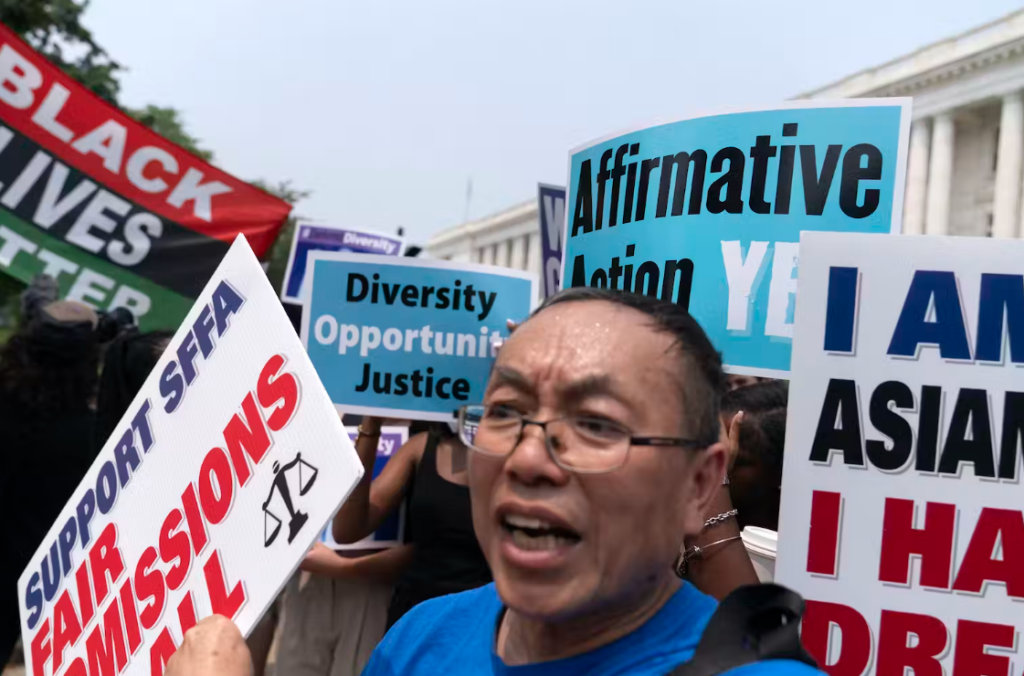Rita Men, Professor of Public Relations and Director of Internal Communication Research, University of Florida
Many companies have made commitments toward diversity, equity and inclusion initiatives in recent years, particularly since the murder of George Floyd sparked weeks of racial justice riots in 2020.
But some of those efforts, such as hiring diversity leaders and creating policies to address racial inequality, have stalled or reversed at the same time as a growing conservative backlash is threatening to further undermine such initiatives.
Most recently, a June 2023 Supreme Court ruling tossing out affirmative action policies at several universities has prompted businesses and advocates to worry that similar corporate efforts to improve the diversity of their workforces may be next.
That would be bad news for companies, because research has shown that diversity, equity and inclusion initiatives improve creativity, innovation, productivity and organizational performance.
What’s more, a majority of workers say they want their employers to do DEI. My own research in corporate communications suggests how employees communicate their efforts is just as important as having them.
DEI and the workplace
Diversity, equity and inclusion are three related values that companies and other organizations use to guide their efforts to create workplaces that are welcoming to people from all walks of life. These values emphasize the respect of individual differences and fair treatment of all people, regardless of race, gender, age, sexual orientation or other factors.
The implementation of DEI measures varies across organizations, with strategies ranging from policies that ensure the fair treatment of workers of color to training and the establishment of employee resource groups, which are internal communities built around workers’ shared identities or interests. Examples include networks for women, people of color or veterans.
While strategies may vary, DEI is in wide use across corporate America. Every Fortune 100 company listed some kind of DEI initiative on its website as of July 2022, and a 2021 survey found that 82% of chief human resource officers said DEI was their foremost concern.

Broad benefits of DEI
Numerous studies on diversity, equity and inclusion policies have found them to have many positive impacts on corporate performance.
Consulting company McKinsey in May 2020 reviewed data on over 1,000 companies in 15 countries and found that the “business case for inclusion and diversity is stronger than ever.”
Its analysis showed that in 2019 companies in the top quartile in terms of ethnic and cultural diversity were 36% more likely to report above-average profits than those at the bottom, slightly better than in 2014. And companies with the most gender diversity among executives were 25% more likely to outperform the market, up from 15% in 2014.
A 2019 study that analyzed workforce diversity in the U.S. federal government found that racial diversity is significantly and positively related to organizational performance.
One of the reasons DEI initiatives have a positive impact is because workers appreciate them. For example, a survey conducted in early 2023 found that most employees – 56% – think it’s a good thing if their company is focused on DEI.
Talking up DEI
But my own work suggests that getting many of these benefits from DEI initiatives may depend on how well employers are communicating their efforts to workers. In 2021, colleagues Sunny Qin, Renee Mitson, Patrick Thelen and I conducted an online survey with 657 full-time employees across 27 industries in the U.S. We published the findings in June 2023.
We asked respondents how well they thought their employers communicated around the topic of diversity, including efforts to promote a diverse workforce. We also assessed participants’ engagement in their companies as well as the employees’ cultural intelligence, or the ability to interact and adapt across cultures. We then used a statistical technique called structural equation modeling analysis to spot relationships between all their answers.
We found that the employees who worked for companies that talked more about their commitment to fostering a diverse and inclusive environment were also more engaged in their work. This was also correlated with higher levels of cultural intelligence, and together they contributed to a more inclusive work environment.
Importantly, we found that this effect was strongest for racial minorities, whose level of engagement was more highly correlated with how well their employer created an inclusive climate than for white people in our survey.
Valued and included
Overall, our study supports the notion that employees still value and appreciate their companies’ focus on diversity, equity and inclusion efforts.
And as we found, a more diverse and inclusive work environment leads to a more engaged workforce when companies continually communicate about their stance, values and commitment to DEI. Such communications signal to employees that their employers hear their voices and stand with them.
Having a diverse and inclusive workplace isn’t just about checking off boxes. It’s about making sure everyone feels valued and included.


















